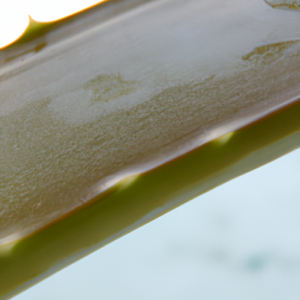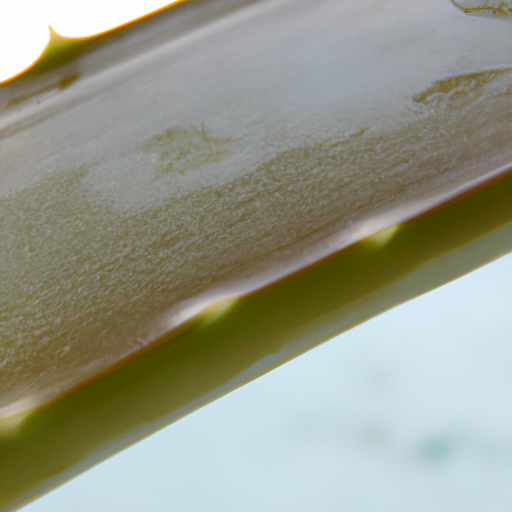Acne scars are a painful reminder of teenage years gone by, or a reminder that you may still be dealing with acne. Either way, they can be annoying and make you feel self-conscious. Fortunately, there might be a natural solution to reducing their appearance: aloe vera! In this blog post I’m gonna give y’all the low down on aloe vera and its potential for treating acne scars.
Overview of Aloe Vera for Acne Scar Treatments
Aloe vera, a succulent plant with thick leaves, has long been used to heal wounds and treat skin conditions. It’s no wonder, then, that aloe vera is becoming increasingly popular in the acne scar treatment world. After all, it has powerful anti-inflammatory, antimicrobial, and moisturizing properties that can help reduce both the redness and inflammation associated with acne. And while there’s no miracle cure-all when it comes to acne scars, aloe vera is definitely worth exploring as an option.
The usage of aloe vera for healing dates back thousands of years. Egyptian queens Cleopatra and Nefertiti were said to have used it for its beautifying benefits, and ancient Greeks and Romans believed it could not only help heal wounds but also ease digestive issues. Nowadays, aloe vera is found in many topical beauty treatments for its antioxidant and moisturizing powers. So it makes sense that it could be used to target acne scars, too.
When applied topically, aloe vera can help soothe inflamed skin, reduce redness, and even minimize the appearance of scars. Studies have shown that aloe vera can help reduce the size of keloid scars, which are caused by excessive collagen production in the skin. It may even help reduce the appearance of pitted scars, like those associated with acne.
Of course, nothing beats a healthy diet and lifestyle for achieving good skin, and using aloe vera on its own isn’t likely to get you the results you want. But when combined with other treatments, it can be a great addition to your skincare routine. If you want to give aloe vera a try, make sure to look for brands that are all-natural, organic, and free of any added preservatives or chemicals.
A Closer Look at the Science Behind Aloe Vera for Acne Scar Treatments
As any good gumshoe knows, delving into the science behind a topic is the only way to get to the bottom of it. With that in mind, let’s dive into the research that has been done on the efficacy of aloe vera for treating acne scars.

Acne scars can be deeply distressing, not only because of their physical appearance but also because of their impact on self-esteem. Thankfully, a number of studies have been conducted to examine the effectiveness of aloe vera as an acne scar treatment.
The results of these studies have been generally positive, with many showing promising results. One study found that when used as part of a comprehensive skin care regimen, aloe vera was able to reduce the appearance of acne scars and even minimize their depth.
Another study found that aloe vera gel was effective in reducing the severity of post-inflammatory hyperpigmentation, which is often associated with acne scars. The participants in this study experienced a significant reduction in pigmentation after just eight weeks of aloe vera use.
Finally, another study found that aloe vera could help improve the texture of the skin by increasing collagen production, which is essential for healthy and glowing skin. This increased collagen production led to a decrease in acne scars as well as a decrease in wrinkles.
These studies provide some evidence that aloe vera may indeed be an effective treatment for acne scars. However, more research needs to be done in order to confirm these findings. In the meantime, those looking for an acne scar treatment should consult with a qualified dermatologist to ensure that the chosen treatment is safe and effective.
What is the Verdict?
Well, after much research and investigation, my verdict on Aloe Vera for acne scar treatments is one of cautious optimism. On the pro side, there are promising signs that Aloe Vera can help reduce inflammation and speed up healing times. Additionally, it’s a natural product so it has minimal side effects compared to harsh chemicals or antibiotics. On the con side, there is still more research needed to determine just how effective Aloe Vera can be as compared to other treatments out there.
When it comes to studies focusing on Aloe Vera specifically as an acne scar treatment, there aren’t many. The current research we do have suggests that when used topically in combination with other treatments, such as retinoids, it can accelerate healing times and reduce the appearance of scars. But much more research is needed to determine just how beneficial this plant really is for treating acne scars.
In conclusion, I recommend using Aloe Vera as part of your acne scar treatment regimen but not as a stand-alone solution. While it may help improve the condition of skin, more comprehensive treatments, like laser therapy and chemical peels, should also be explored. Talk to your doctor about which treatment options would be best for you.
Conclusion
Alright, after sifting through all this stuff, I think it’s time to put the brakes on and get to the verdict. After all, that’s what we’re here for. So let’s see just how effective Aloe Vera is for treating acne scars.
First off, it looks like there is some promising evidence out there that suggests that Aloe Vera can be an effective treatment for acne scars. While there are some drawbacks to using the plant’s extract, such as skin irritation and potential allergic reactions, the benefits seem to outweigh the risks. Plus, with its low cost and easy-to-find availability, it makes it a good option to consider — especially if you’ve been dealing with acne scars for a while now.
At the end of the day, though, it’s important to remember that everyone is different. What works for one person might not necessarily work for another. So if you’re interested in trying out Aloe Vera for treating your acne scars, it’s important to speak with a medical professional first to make sure it’s right for you.
And that’s the bottom line when it comes to Aloe Vera and acne scar treatments: while it can be effective, there’s no guarantee it will work for everyone. So don’t forget to do your due diligence and consult with your doctor before taking the plunge. Good luck!
Skin Care FAQs
Can aloe help with old scars?
A lot of people have been asking me: can aloe vera help with old scars? Well, the answer isn’t as simple as a “yes” or “no.” Aloe vera has been used for thousands of years as a home remedy for skin problems and wounds, and research has shown it can be effective in treating some types of acne scars.
That being said, aloe vera doesn’t always work. It’s important to note that acne scars can come in many different forms, including raised or flat areas, discolorations, or indentations. If a scar is resistant to over-the-counter treatments or topical treatments, it’s best to seek out an expert dermatologist.
Overall, I would say that aloe vera can help with some acne scars, however, it might not work as a miracle cure. If you’re looking to get rid of an old scar, it’s best to discuss your options with a doctor and make sure you take into consideration factors such as your skin type, age, and the severity of the scar. And, most importantly, make sure that any treatments you use are safe and have been approved by a medical professional.
What is the best treatment for old acne scars?
I’m no miracle worker, but I’ve heard that aloe vera can help reduce the appearance of old acne scars. It’s an old wives’ tale that’s been around for a while, but many people have had success with it. I’ve used it myself and have seen a noticeable improvement in the appearance of my scars.
Aloe vera works by reducing inflammation and promoting healing. It also contains vitamins, minerals and antioxidants that may help diminish the appearance of acne scars. It has natural anti-bacterial, anti-fungal and anti-inflammatory properties that can help reduce redness and soothe skin.
I recommend giving it a try. Start by applying a small amount of aloe vera gel directly to affected areas of the skin, then leave it on for about 15 minutes. It’s best to do this twice a day for several weeks to see if it makes a difference.
If you’re not seeing any improvement after several weeks or if your skin starts to feel irritated, then stop using the aloe vera and talk to your doctor to see if they have any other recommendations that might suit you better. Everyone’s skin is different, so what works for one person may not work for another – so always consult your doctor before trying anything new.
